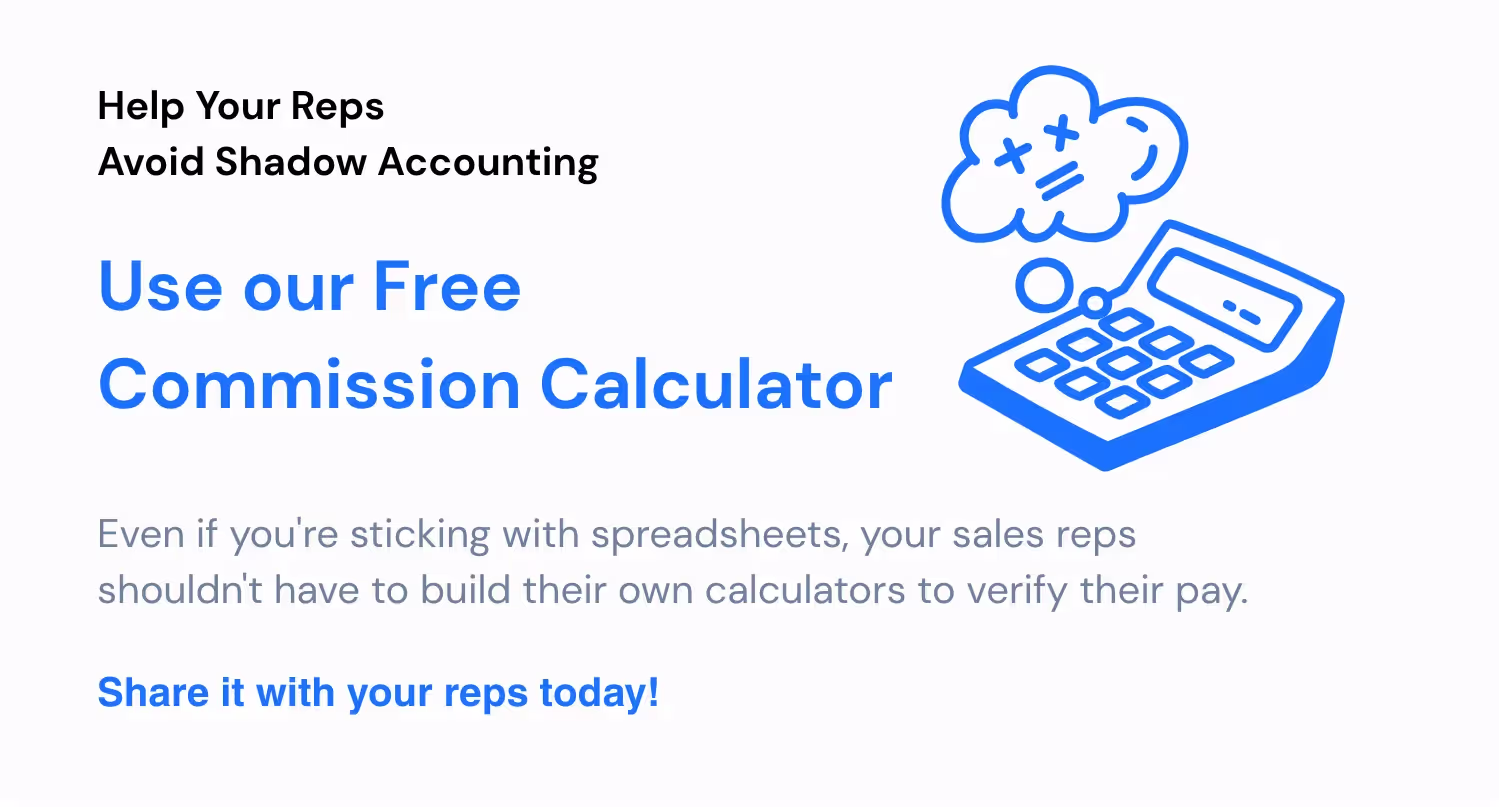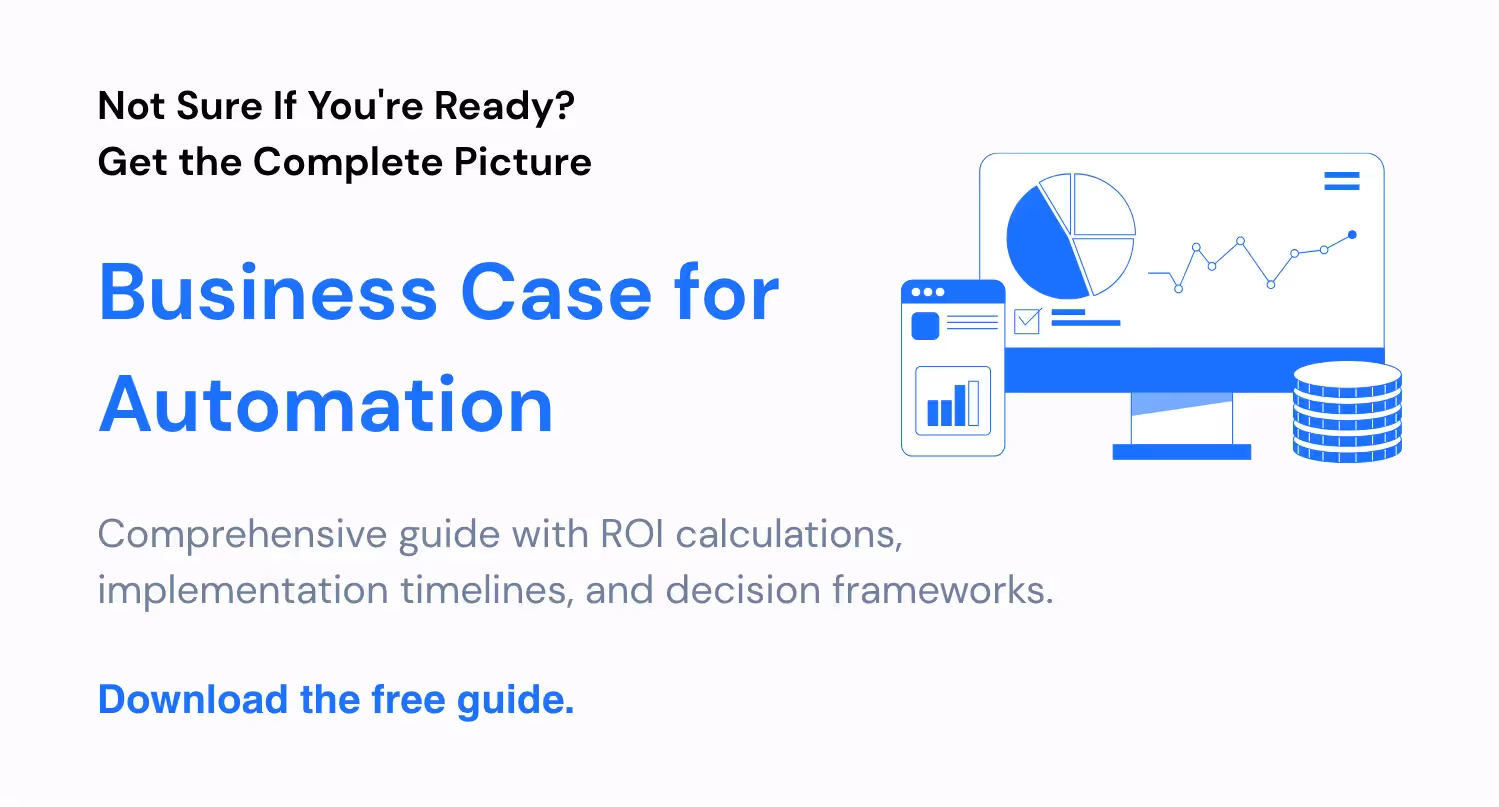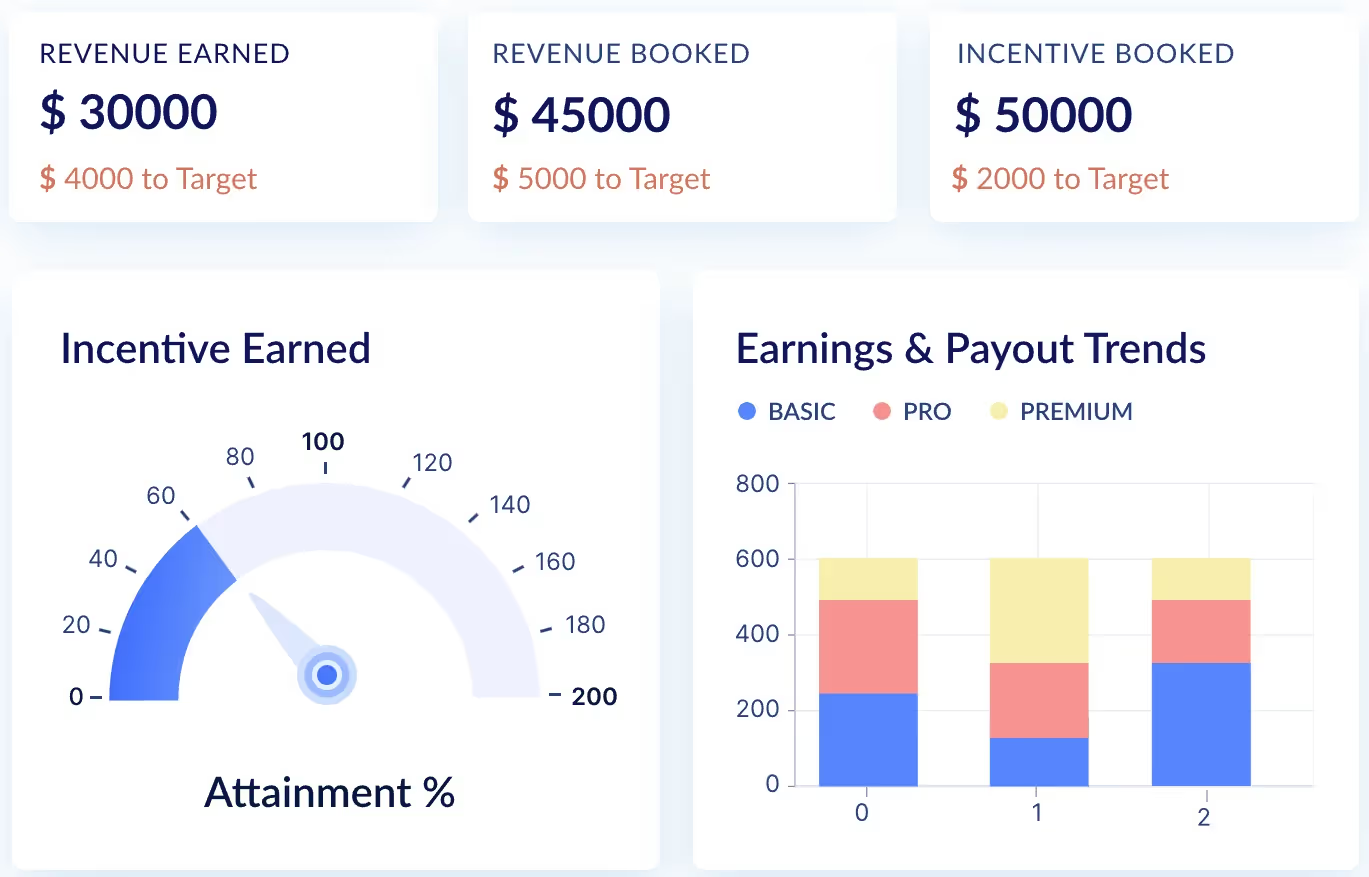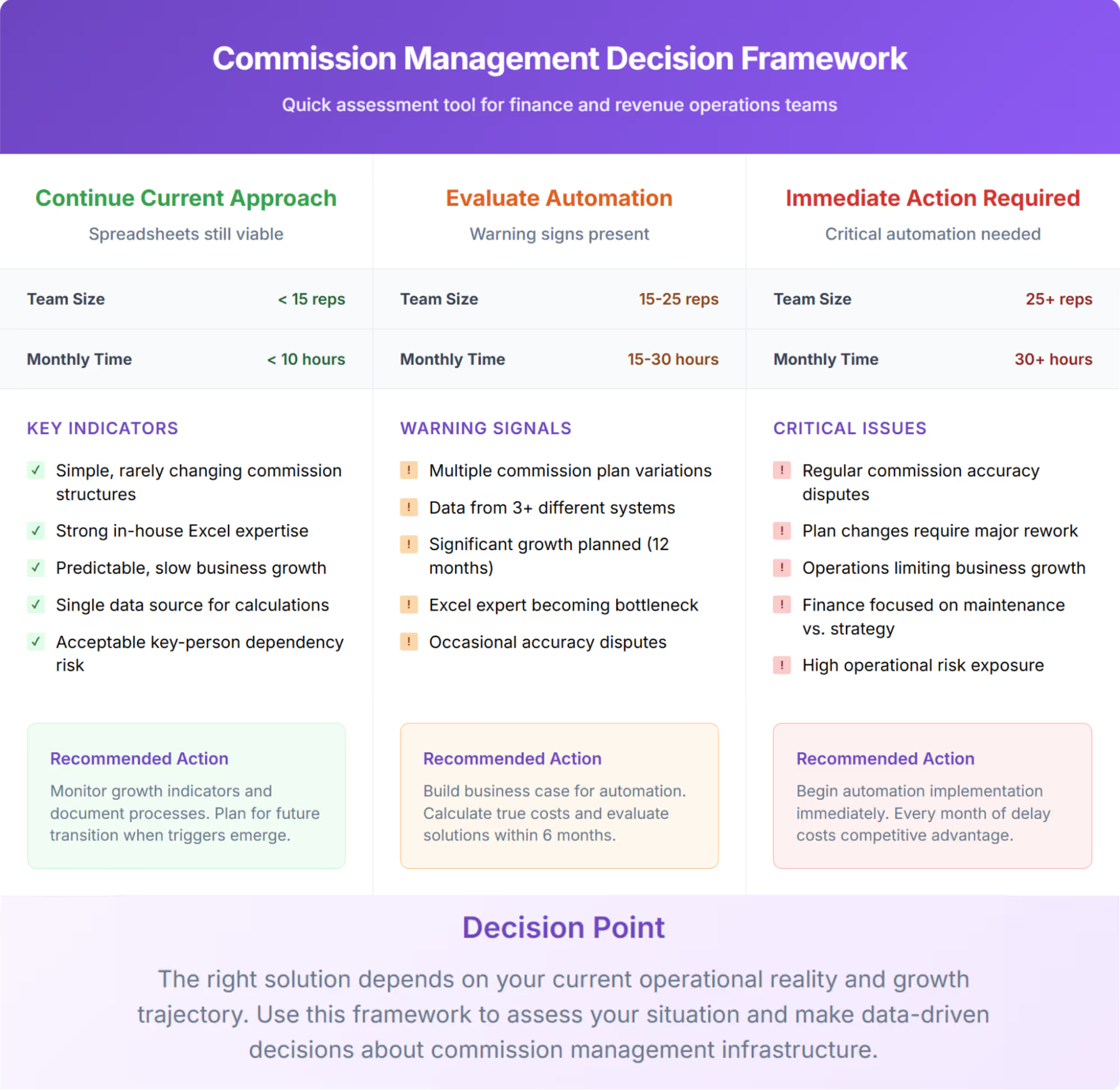Visdum vs Spreadsheets: An Honest Guide to Sales Comp Automation

If you've ever spent a Sunday evening debugging commission formulas while your sales team sends increasingly frustrated Slack messages about their payouts, this article is for you.
We're going to walk through the complete journey of sales commission management - from those early days when a simple IF statement felt powerful, to the inevitable complexity that breaks even the most sophisticated spreadsheet models.
More importantly, we'll help you figure out where you are in this journey and what your realistic options look like.
Key Takeaways
- Spreadsheets work fine for simple commission calculations but break down as companies grow and plans become complex.
- Growing sales teams create data chaos - companies need to pull information from different systems just to calculate commissions.
- Manual processes consume massive amounts of time that should be spent on strategy instead of formula debugging.
- Sales reps lose trust when they can't understand how their paychecks are calculated, leading to shadow accounting and disputes.
- Companies like CV Library managed 85 reps across 25 different commission plans using separate spreadsheet calculations for each person.
- Automation dramatically reduces processing time - Web Engage went from 168 hours monthly to just 6 hours after switching to Visdum.
- Dispute resolution improves significantly when reps have visibility - Haptic saw commission disputes drop from 18 per quarter to only 2.
- Payout speed increases help cash flow and morale - GoComet reduced their payout time from 7 days to 1 day.
- Real-time transparency motivates sales teams because they can see exactly how their work translates to earnings.
- Automated systems eliminate the "Excel expert" risk where entire commission processes depend on one person's spreadsheet knowledge.
- Modern commission platforms handle complexity better than spreadsheets - the more complex your plans, the more automation pays off.
- Implementation happens faster than expected, with most companies going live within weeks rather than months.
The Journey Every Growing Company Takes
Here is the real story of how commission management evolves, why spreadsheets eventually fail, and how to know when you're ready for something better.
Chapter 1: The Honeymoon Phase
Remember when commission calculations felt manageable? You had maybe 10 sales reps, one straightforward plan, and this elegant formula:
Spreadsheet
=IF(E5>250000,0.05,IF(E5>149999,0.03,IF(E5>74999,0.01,0)))
It worked beautifully.
Over $250K in sales? 5% commission. Between $150K-$250K? 3%. And so on.
You felt pretty clever.
The whole process took maybe 2 hours per month. Your CFO was happy with the cost (basically zero). Your sales team trusted the numbers. Life was good.
But here's what nobody tells you about this phase: you're already creating your future headache.
That formula only works because everything is simple. One plan. One calculation. One person who understands it.
The moment your business grows - more reps, different roles, slightly more complex incentives - that elegant formula becomes the first domino in a chain reaction that ends with someone crying over a spreadsheet at 2 AM.
Chapter 2: The Complexity Creep
Business is growing. Your VP of Sales wants to get sophisticated with incentives. "What if we do sliding scales? What about quota-based tiers? Maybe accelerators for overperformance?"
Now your formula looks like this:
Spreadsheet
=IF(C10<50000,C10*E12,VLOOKUP(C10,C2:E23,2,TRUE)+(C10-VLOOKUP(C10,C2:E23,1,TRUE))*VLOOKUP(C10,C2:E23,3,TRUE))
Let's break down what this monster actually does:
- If sales are under $50K, use the base rate
- Otherwise, find the base commission from your tier table
- Calculate how much they sold above their tier
- Multiply that excess by the higher tier rate
- Add it all together
It's clever, but now you need absolute references when copying formulas ($F$2:$F$10), and heaven help you if someone accidentally deletes a row in your lookup table.
You're spending 15-20 hours per month on commissions now. You've become the "spreadsheets person" everyone depends on. People are starting to ask questions about accuracy, and you're finding small errors that make you wonder what else you've missed.
This is still manageable, but the warning signs are flashing. You're one plan change or team expansion away from serious trouble.
Chapter 3: The Breaking Point
Fast forward 18 months. You now have 35 sales reps across different roles - enterprise, SMB, inside sales, maybe some channel partners. Your commission plans have evolved into something that requires actual documentation because nobody else can figure out how they work.
You're dealing with:
- Collection-based commissions (deal data from Salesforce, payment data from QuickBooks)
- Quota-based tiers with different rates for different achievement levels
- Mid-year plan changes because the market shifted
- Currency conversions for your international reps
- Clawbacks when deals get refunded
Your formulas now look like this:
Spreadsheet
=IF(AND(rep_type="Enterprise",region="EMEA",tenure>12),
IF(booking_amount>quota*0.8,
VLOOKUP(booking_amount,tier_table,2,1)*collection_rate+
IF(booking_amount>quota,
(booking_amount-quota)*accelerator_rate*fx_rate,0),
booking_amount*base_rate*fx_rate),
"ERROR: Contact the Excel person")
You're spending 25-40 hours per month just keeping the calculations working. Your monthly process looks like this:
- Monday: Export data from Salesforce (clean up duplicate records, fix missing fields)
- Tuesday: Export collection data from QuickBooks (match deals to payments, handle partial collections)
- Wednesday: Manually reconcile the data (why doesn't this deal show up in both systems?)
- Thursday: Update all the different plan spreadsheets (pray you don't break any formulas)
- Friday: Run calculations and generate statements (debug the inevitable errors)
- Weekend: Answer questions from sales reps who think their numbers are wrong
- Next Monday: Fix the errors you found over the weekend and rerun everything
Sound familiar?
📊 Reality Check: If you're spending more than 15 hours per month on commission calculations, you're likely losing money even if you don't realize it.
Our Sales Comp Automation ROI Calculator shows the true cost of spreadsheet management including all the hidden expenses most companies miss.
Chapter 4: The Nightmare Scenario
Companies that push through Chapter 3 often end up in spreadsheet hell. We've seen real companies dealing with: 85 sales reps, 25+ different commission plans, separate calculations required for each rep every cycle. They were spending 90% of their time on manual processes instead of strategic work.
At this stage, your formula complexity has reached breaking point:
Spreadsheet
=SUMPRODUCT(
(deal_close_date>=start_date)*
(collection_date<=end_date)*
(deal_amount)*
(IF(rep_tenure>12,senior_rate,junior_rate))*
(IF(region="EMEA",eur_fx_rate,1))*
(IF(deal_type="Enterprise",enterprise_multiplier,1))*
(IF(quota_achievement>1,accelerator_rate,standard_rate))
)
The real problem isn't just the complexity - it's that you're now running a mission-critical business process that depends entirely on formulas only one or two people understand.
When that person goes on vacation or, worse, leaves the company, your entire revenue operation can grind to a halt.
The Hidden Costs Nobody Talks About
Most companies focus on the obvious costs - time spent building and maintaining spreadsheets. But the real damage happens in ways you might not even track:
The Trust Erosion
When sales reps can't understand how their commissions are calculated, they start building their own spreadsheets to verify the numbers. Now you have multiple versions of the truth, and your sales team is spending selling time on "shadow accounting."

The Error Cascade
Research shows 90% of spreadsheets contain errors. When those errors involve people's paychecks, the consequences compound quickly. Overpayments require awkward clawback conversations. Underpayments destroy trust and motivation.
The Opportunity Cost
Your finance team should be analyzing performance trends, optimizing compensation strategies, and providing strategic insights to leadership. Instead, they're troubleshooting VLOOKUP errors and explaining why John's commission statement doesn't match what he calculated.
The Scaling Wall
Eventually, you hit a wall where the operational overhead of spreadsheet management starts limiting your ability to grow. You can't launch new incentive programs because they're too complex to implement. You can't expand into new markets because you can't handle currency conversions. You can't hire more reps because you can't scale the administrative work.
When Companies Choose Automation
We've studied dozens of companies that made the transition from spreadsheets to automated commission management. The decision point usually comes when one of these happens:
The "Sunday Night Syndrome" - You're regularly working weekends to keep commission calculations running, and it's affecting your work-life balance or team morale.
The "Growth Bottleneck" - Your sales team is ready to scale, but you can't hire more reps because you can't handle the operational complexity.
The "Trust Crisis" - Disputes over commission accuracy are becoming frequent enough to damage relationships between sales and finance teams.
The "Key Person Risk" - You realize that if the "Excel person" leaves, your entire commission process could collapse.
Companies like Cyble, GoComet, and Haptic reached these decision points at different stages, but they all found that specialized platforms like Visdum solved the underlying problems rather than just treating the symptoms.

What Modern Commission Management Actually Looks Like
Instead of building increasingly complex formulas, modern commission management platforms handle the complexity at the system level. Here's what that means in practice:
Automated Data Integration
Rather than manually exporting and matching data from multiple systems, platforms like Visdum automatically sync with your CRM, billing system, and other tools.

The data reconciliation that used to take hours happens automatically in real-time.
Cyble, for example, automated eight different data sources with real-time sync, eliminating the manual work entirely.
Read more.
Visual Plan Configuration
Instead of nested IF statements and VLOOKUP chains, you get drag-and-drop plan builders that handle complex logic visually.

Want sliding scale commissions? Click and configure. Need quota-based tiers? Set them up in minutes, not hours.
CV Library moved all 25 of their unique commission plans into a single system where changes could be made quickly and safely.
Read more.
Real-Time Transparency
Sales reps get personalized dashboards showing exactly how their commissions are calculated, their progress toward quotas, and estimated future earnings based on their pipeline.

This eliminates the shadow accounting problem and builds trust.
Haptic saw their dispute rate drop by 90% - from 18 disputes per quarter down to just 2 - largely because of improved transparency.
Read more.
End-to-End Automation
The entire process, from data collection through calculation to statement generation, runs automatically. Finance teams can focus on strategy instead of maintenance.
Web Engage reduced their monthly commission processing time from 168 hours down to just 6 hours.
Read more.
The Real ROI of Getting This Right
Let's be honest about the numbers. A good commission management platform isn't free, but neither are spreadsheets when you account for all the hidden costs.
Time Recovery: Companies typically save 60-80% of the time they were spending on commission calculations. For a team spending 30 hours per month on this work, that's 20+ hours back for strategic initiatives.
Error Reduction: Moving from spreadsheets to automated calculation typically improves accuracy from around 85-90% to 99%+. For a company paying $2M annually in commissions, even a 2% error rate costs $40,000 in overpayments, underpayments, and dispute resolution.
Sales Performance: When reps can see real-time progress toward their goals and trust the accuracy of their statements, productivity typically improves by 5-15%. For a 30-person sales team, even a 5% improvement can mean millions in additional revenue.
Strategic Value: Perhaps most importantly, automation frees up your finance and RevOps teams to work on optimization rather than just maintenance. That strategic capability is hard to quantify but often becomes the most valuable benefit.
Your Next Steps
If you've read this far, you probably recognize your company somewhere in this journey. The question is: what's your next move?
If You're Still in the Early Stages
You might have some time before spreadsheets become unmanageable, but this is actually the best time to start planning. Document your current processes, understand what drives complexity in your business, and keep an eye on the warning signs.
You might also benefit from our advanced Excel templates and best practices guide, which can help you manage complexity more effectively while you're still in the spreadsheet phase.
If You're in the Danger Zone
You probably have 6-12 months before your current approach becomes unsustainable. This is the time to start seriously evaluating alternatives and building a business case for change.
We'd recommend doing a thorough cost-benefit analysis that includes all the hidden costs of your current approach. Our ROI calculator can help you quantify the true cost of spreadsheet management.
If You're Already in Crisis Mode
Every month you wait is costing you money and competitive advantage. Companies in this situation typically see payback on commission management platforms within 3-6 months.
The good news is that modern platforms can be implemented quickly - usually 4-8 weeks from decision to go-live. The implementation is typically handled by your RevOps team with light IT support for integrations.

Getting Help with Your Decision
Whether you're ready to make a change now or just starting to think about your options, we're here to help you make the right decision for your specific situation.
If you're ready to explore automation, we can show you exactly how a platform like Visdum would work with your specific commission plans and data sources. No generic demos - we'll use your actual scenarios.
If you're still in planning mode, we have resources and tools to help you evaluate your situation, calculate the true costs of your current approach, and build a timeline for when change makes sense.
If you want to optimize your current spreadsheet approach, we have templates, formulas, and best practices that can help you manage complexity more effectively while you're preparing for eventual automation.
The most important thing is making the right decision for your business at the right time. We've seen companies succeed with both approaches, and we've seen companies fail when they chose the wrong tool for their situation.
Want to explore your options?
We're happy to provide an honest assessment of where you are and what makes sense for your specific situation - even if that means staying with spreadsheets for now.
Get in touch with sales compensation experts and let's figure out the right path forward.



.webp)

